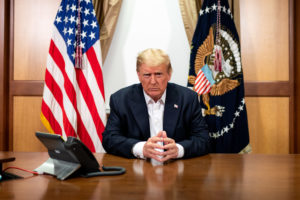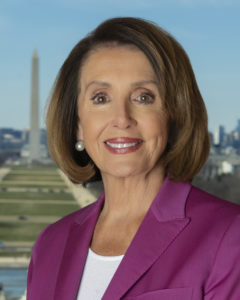
Trump ends COVID-19 stimulus bill talks; NFIB, U.S. Chamber urge more negotiations
By onAnnouncements | Associations | Business Practices | Legal | Market Trends
Two major national business organizations on Tuesday urged the White House and congressional lawmakers to continue negotiations on a COVID-19 stimulus bill following Republican President Donald Trump tweeting he had halted negotiations until after the election next month.
“Small businesses across the country are doing everything they can to support their employees, families, and communities despite the difficult situation of slower sales and increasing economic uncertainty,” National Federation of Independent Business federal government relations Vice President Kevin Kuhlman said in a statement Tuesday. “According to NFIB research, half of small business owners anticipate needing additional financial assistance to survive. Many small businesses and their employees cannot afford to wait – they need Washington to act. More than one-in-five small business owners will likely be forced to close their doors under current economic conditions in the coming months, according to our recent surveys. We urge Congress and the Administration to continue negotiations and consider legislation that has broad bipartisan agreement – small business recovery assistance – so that small businesses, our nation’s economic engine, can continue to move forward.”
“Washington’s failure to enact additional COVID relief will be felt on Main Streets and at kitchen tables across the United States,” U.S. Chamber of Commerce Executive Vice President and Chief Policy Officer Neil Bradley said in a statement. “It is especially disappointing given that less than a month ago a bipartisan group of Members of Congress outlined a reasonable compromise that would have provided the economy with the support it needs while helping our nation recover from this pandemic. Republican and Democratic leaders should follow their example.”
Trump accused House Speaker Nancy Pelosi, D-Calif., of acting in bad faith.
“Nancy Pelosi is asking for $2.4 Trillion Dollars to bailout poorly run, high crime, Democrat States, money that is in no way related to COVID-19,” Trump tweeted. “We made a very generous offer of $1.6 Trillion Dollars and, as usual, she is not negotiating in good faith. I am rejecting their request, and looking to the future of our Country. I have instructed my representatives to stop negotiating until after the election when, immediately after I win, we will pass a major Stimulus Bill that focuses on hardworking Americans and Small Business. I have asked @senatemajldr Mitch McConnell not to delay, but to instead focus full time on approving my outstanding nominee to the United States Supreme Court, Amy Coney Barrett. Our Economy is doing very well. The Stock Market is at record levels, JOBS and unemployment also coming back in record numbers. We are leading the World in Economic Recovery, and THE BEST IS YET TO COME!”
…request, and looking to the future of our Country. I have instructed my representatives to stop negotiating until after the election when, immediately after I win, we will pass a major Stimulus Bill that focuses on hardworking Americans and Small Business. I have asked…
— Donald J. Trump (@realDonaldTrump) October 6, 2020
In a statement Tuesday, Pelosi called Trump’s action a sign “the White House is in complete disarray.” She said Trump was “rejecting the urgent warnings of Fed Chairman Powell.”
According to a copy of a speech shared by the Federal Reserve, Chairman Jerome Powell on Tuesday told the National Association for Business Economics that the economy had indeed improved significantly, but “(t)he expansion is still far from complete. At this early stage, I would argue that the risks of policy intervention are still asymmetric.”
“Too little support would lead to a weak recovery, creating unnecessary hardship for households and businesses,” he continued, according to the speech copy shared by the Fed. “Over time, household insolvencies and business bankruptcies would rise, harming the productive capacity of the economy, and holding back wage growth. By contrast, the risks of overdoing it seem, for now, to be smaller. Even if policy actions ultimately prove to be greater than needed, they will not go to waste. The recovery will be stronger and move faster if monetary policy and fiscal policy continue to work side by side to provide support to the economy until it is clearly out of the woods.”
Pelosi cited part of this passage in her statement.
Trump later agreed with Powell that Congress should act, but accused Democrats of “playing ‘games’ with the desperately needed Workers Stimulus Payments.”
True! https://t.co/ZJmcxG2CoO
— Donald J. Trump (@realDonaldTrump) October 6, 2020
Crazy Nancy Pelosi and the Radical Left Democrats were just playing “games” with the desperately needed Workers Stimulus Payments.They just wanted to take care of Democrat failed, high crime, Cities and States. They were never in it to help the workers, and they never will be!
— Donald J. Trump (@realDonaldTrump) October 6, 2020
“Walking away from coronavirus talks demonstrates that President Trump is unwilling to crush the virus, as is required by the Heroes Act,” Pelosi said in a statement. “He shows his contempt for science, his disdain for our heroes – in health care, first responders, sanitation, transportation, food workers, teachers, teachers, teachers and others – and he refuses to put money in workers’ pockets, unless his name is printed on the check.
 “At the same time, the President is abandoning meeting the needs of our children as they adjust to learning in-person, virtual or hybrid. Instead, Trump is wedded to his $150 billion tax cut for the wealthiest people in America from the CARES Act, while he refuses to give real help to poor children, the unemployed and America’s hard working families.”
“At the same time, the President is abandoning meeting the needs of our children as they adjust to learning in-person, virtual or hybrid. Instead, Trump is wedded to his $150 billion tax cut for the wealthiest people in America from the CARES Act, while he refuses to give real help to poor children, the unemployed and America’s hard working families.”
Senate Republicans could have continued to negotiate and pass a bill anyway and send it to Trump for a signature or veto. But U.S. Sen. Mitch McConnell, R-Ky., told CNN reporter Manu Raju he agreed with Trump, the correspondent tweeted late Tuesday afternoon.
“I think his view was that they were not going to produce a result and we need to concentrate on what’s achievable,” McConnell told CNN.
“Today, once again, President Trump showed his true colors: putting himself first at the expense of the country, with the full complicity of the GOP Members of Congress,” Pelosi said in her statement.
In addition to the NFIB and Chamber, automotive aftermarket trade groups also have sought additional aid from Congress besides the hundreds of billions of dollars already passed this year.
Nearly 140 regional and national associations in July have encouraged congressional small business committee leaders to support Senate Bill 4117, a narrow bipartisan measure to easily forgive Paycheck Protection loans through $150,000. Familiar automotive aftermarket names like SCRS, MEMA, SEMA, NADA, TIA and the Auto Care Association joined interests like the U.S. Chamber to express support for the measure.
And more than than 100 local and national business associations — including automotive aftermarket players like SCRS, the Automotive Service Association and Auto Care Association — have joined together as the America’s Recovery Fund Coalition and advocated a federal COVID-19 business grant initiative.
That coalition has previously expressed enthusiasm for a bipartisan House Resolution 7671, which would grant companies impacted by the COVID-19 response four months worth of certain operating expenses. Unlike the PPP, these payouts of up to $50 million would effectively be a gift, not a forgiveable loan.
Be heard: Trump can be reached here. Congressional contact information can be found here.
Images:
Republican President Donald Trump is seen during a phone call Oct. 4, 2020, in Walter Reed National Military Medical Center. (Tia Dufour/White House)
U.S. House Speaker Nancy Pelosi, D-Calif., (Provided by U.S. House)
